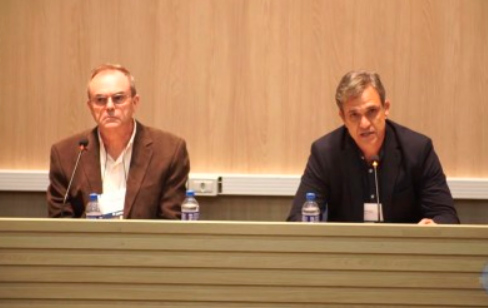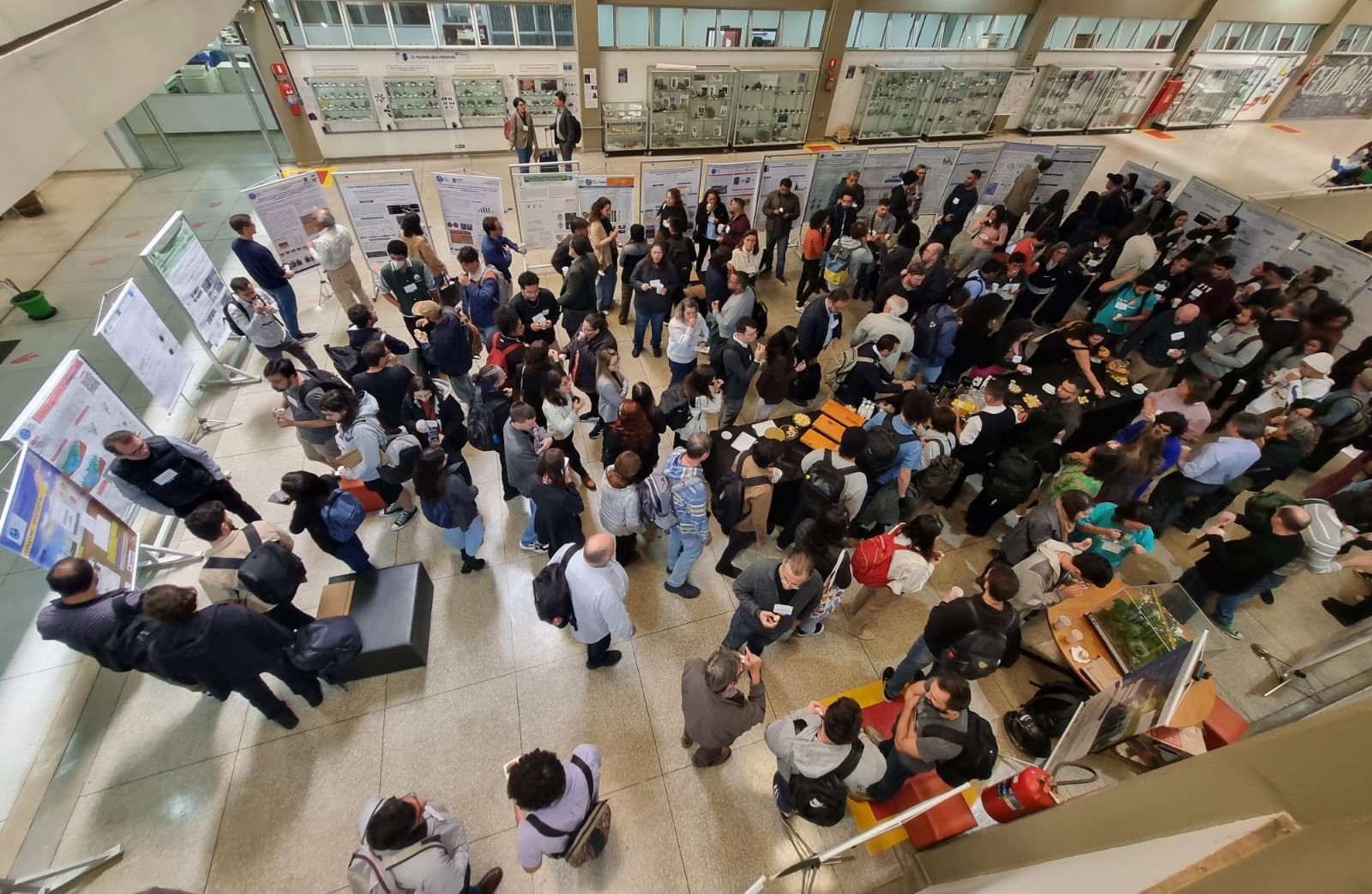


Célio Haddad and Luiz Aragão opened the workshop (image: reproduction).
Published on 09/10/2024
By André Julião | Agência FAPESP – In the week when Observatório do Clima published a study showing that a 92% reduction in Brazil’s greenhouse gas emissions is required by 2035 if global warming is to be restricted to 1.5 °C above the preindustrial level, principal investigators and other researchers affiliated with the FAPESP Research Program on Global Climate Change (RPGCC) met at the State University of Campinas’s Institute of Geosciences (IG-UNICAMP) in Brazil.
The purpose of the meeting, which took place on August 27-28, was to discuss current research priorities in the area and ways of integrating projects so as to stimulate interaction, structure ideas, and organize joint activities. The program and complete recordings of all sessions are available online.

The meeting took place at UNICAMP’s Institute of Geosciences(foto: Vera Sirin/Agência FAPESP)
“The climate crisis intensifies with every passing day. We need to provide information, produce cutting-edge knowledge, and above all develop solutions so that Brazil can move ahead with actions to mitigate and adapt to the effects of the crisis, and to achieve sustainable economic development,” said Luiz Aragão, a researcher at the National Space Research Institute (INPE) and an advisor on climate change to FAPESP’s Office for Strategic Programs and Infrastructure in its Scientific Directorate.
Land-use change accounts for 70% of Brazil’s emissions, he noted. Forests and agriculture are therefore key sectors on which to focus. “The challenge is huge. We need robust long-term investment in this area,” he said.
In light of the extreme events that have ravaged most parts of Brazil this year, including the ongoing wildfires in São Paulo State and elsewhere, Aragão proposed a emergency funding line for fast-track approval of projects that accurately analyze the impacts of these events.
This has been the warmest year in history, with the US National Oceanic and Atmospheric Administration (NOAA) estimating that the average temperature on the continent is 1.9 °C above the pre-industrial level. “We’re beyond 1.5 °C and the consequences are visible,” he said.
For Célio Haddad, full professor at São Paulo State University’s Institute of Biosciences (IB-UNESP) in Rio Claro, representing FAPESP’s Scientific Director at the event, the topic is most important and directly affects society as well as all plant and animal species.
“If it’s hard to adapt our economy, our lives, to climate change, what about species that have evolved over millions of years? Many of them simply can’t adapt to these profound changes that are occurring in such a short period of time,” he said.
Pressing needs
The workshop offered an opportunity for researchers funded by the RPGCC to exchange perceptions about their work and discover shared interests or findings. Since its inception in 2008, the program has supported 157 research projects, 32 of which are active, and educated some 690 young researchers to master’s or PhD level (more than 100 of whom are training now).
One of the points raised was the need for better climate and forecasting models. “Some models, including those used by the IPCC [Intergovernmental Panel on Climate Change, a United Nations body], consider only two types of trees for the tropical region, although there are many more,” said David Lapola, Principal Investigator at UNICAMP’s Center for Meteorological and Climate Research Applied to Agriculture (CEPAGRI).
Lapola’s work focuses on measuring the effects of carbon dioxide (CO2) on trees by means of field experiments, large databases and analysis using supercomputers, including the development of models and future scenarios (more at: https://agencia.fapesp.br/51531).
Lack of data integration is a problem for climate and weather models. To find a solution, a consortium of researchers from various parts of the world is developing a community-based model.
“The goal is to simulate oceans, continents and atmosphere in a model of the terrestrial system that will be community-based and unified via a single computer code. It's a new paradigm, especially as far as Latin America is concerned,” said Gilvan Sampaio, a researcher at INPE.
The new model is called Monan (after a Tupi-Guarani god of terraforming) and is global rather than regional, unlike existing models. The first version, set to start running in 2025, will have weather forecasting resolutions of 10 km and 3 km. “In some cases, such as metropolitan São Paulo, it will be even finer, possibly down to 1 km,” he said.
Both Sampaio and Lapola stressed the need for curated open data repositories to feed the models. Artificial intelligence tools are already in use in Europe to make models more accurate and could be integrated into local systems.
Given the increasing frequency of extreme events, weather forecasting is a key factor in planning actions to mitigate and adapt to climate change. An audience contribution from Luciana Gatti, a researcher at INPE, recalled that the number of deaths due to severe natural disasters is also rising.
“São Paulo State has had the second-largest number of deaths due to extreme events, probably because it’s number one in deforestation in Brazil. We need a clear policy to mitigate and address what’s happening. There are going to be more and more heat waves, and we know what a gigantic task is facing us,” she said.
A recording of the first day of the workshop is at: https://youtu.be/E7c2dRO5Fwo (morning) and https://youtu.be/YYowfS3iy34 (afternoon).
A recording of the second day is at: https://youtu.be/tBAKma4MluU (morning) and https://youtu.be/hNsq8l-RUjo (afternoon).
The program and list of speakers are at: https://fapesp.br/16957.
Source: https://agencia.fapesp.br/52722